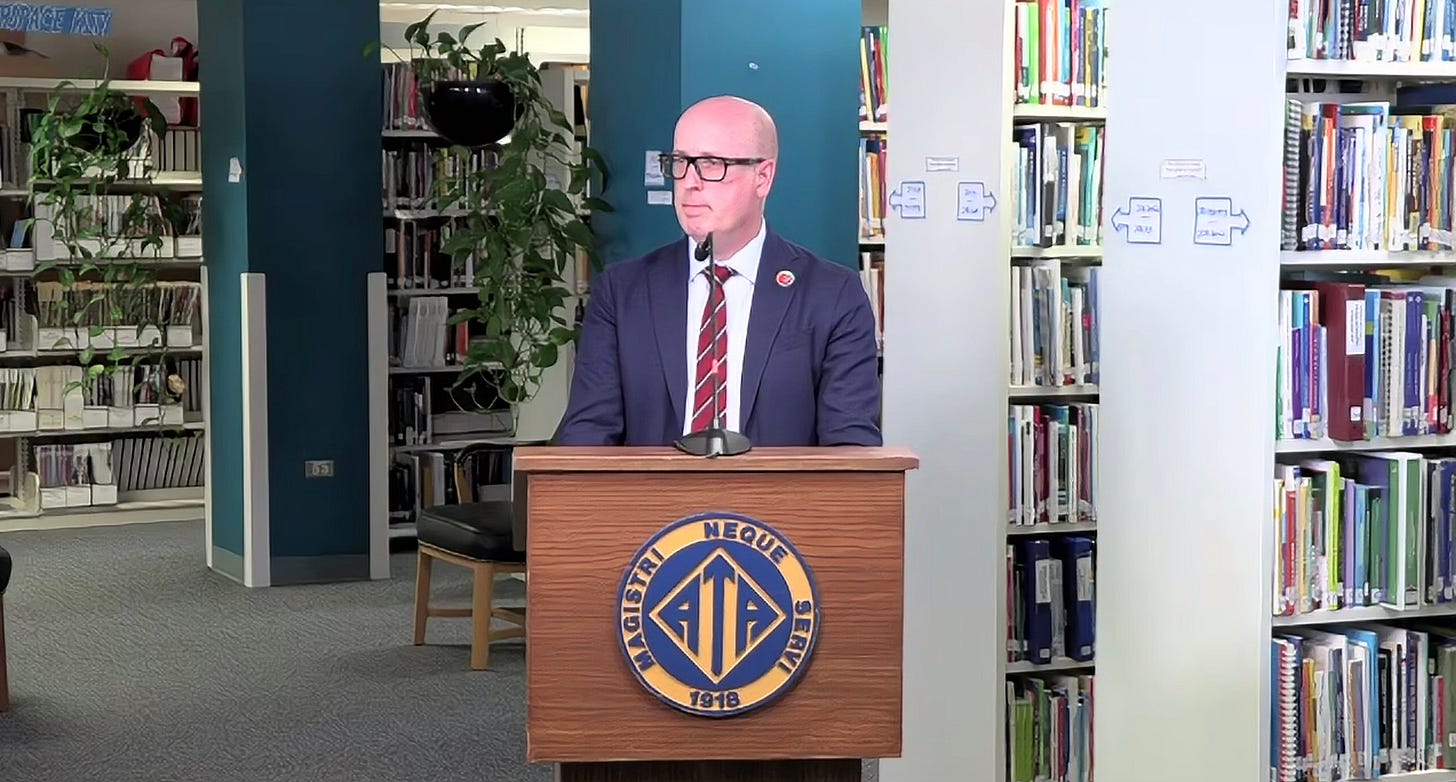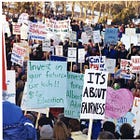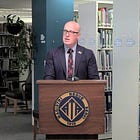Alberta teachers set Oct. 6 strike deadline amid ongoing contract dispute
Plus, health-care workers vote down a tentative agreement negotiated with the employer by a wide margin, but don't expect a strike anytime soon.

The Alberta Teachers’ Association (ATA) has announced that it’s prepared to go on strike, but it isn’t quite ready to pull the trigger yet.
On Wednesday, ATA president Jason Schilling revealed that the teachers’ union will go on strike on Oct. 6—the day before their 120-day strike mandate expires—if the province isn’t willing to offer an acceptable deal by then.
“Public education is in a crisis. Full stop,” Schilling said at an Edmonton news conference. “Whether the government chooses to acknowledge it or not, the reality is undeniable. Students are being short changed and our teachers are being pushed to the brink.”
If teachers do exercise the 95% strike mandate they received, they’ll be doing so without any strike pay. Schilling said they were aware of the provincial executive’s decision to forego picket line pay when they voted in May.
“That to me shows a profound commitment from teachers across this province to do what’s right for kids,” he noted
In a joint Aug. 28 statement, Finance Minister Nate Horner and Education Minister Demetrios Nicolaides alleged the ATA’s “primary interest is in diverting supports away from the classroom to further drive up teacher compensation.”
On Wednesday, Schilling said this “insulting” accusation creates a false binary between teachers’ compensation and supporting students.
“Teachers should not have to choose one for the other,” he said, pointing to the fact that Alberta spends less by far on education per student than any Canadian province or territory.
The Teacher Employers’ Bargaining Association (TEBA), which represents the province in negotiations with the ATA, voted in favour of the right to lock teachers out, which it said it would only use “if it appears that union tactics could harm students and families.”
Like a strike vote, the employer would have to provide at least 72 hours’ notice before locking employees out of their workplaces.
In response to a reporter’s question, Schilling emphasized that the ATA chose to give almost four weeks’ notice, rather than the minimum three days, to give parents, students and teachers “clarity” so that they “can prepare and be ready” in the event of a strike.
TEBA has offered to hire 3,000 additional teachers over three years, which Schilling said “is a start, but it doesn't begin to meet the needs created by years of neglect and record enrolment growth.”
The ATA president added that teachers’ pay has increased just 5.75% over the past decade.
“A fair wage is not just about money. It's about respecting the value of teachers and ensuring that Alberta can attract and retain them,” he said.
TEBA has offered a 12% increase over four years, with some further adjustments to the pay grid, but Schilling previously said the government is refusing to budge on these pay grid adjustments, to which the ATA bargaining committee has offered counter-proposals.
“Teachers have taken bargaining seriously, and as bargaining drags on, they continue to show up every day for students in good faith, but they are tired of being disrespected and vilified by the government, tired of distractions that downplay the real issues, and tired of being asked to do more with less teacher,” Schilling said at the Sept. 10 announcement.
At an unrelated press conference, Premier Danielle Smith said it’s unfortunate that teachers were planning to go on strike, citing the “great progress” that has been made on the “foundational issues we’re hearing from teachers,” which she identified as class sizes and complexity, not compensation.
Schilling countered that he doesn’t know what Smith is talking about.
“I would invite the premier to visit any school across this province and to see for herself the damage that has been done by chronic underfunding,” he said, adding:
We have teachers who have been dealing with the largest classes that they’ve ever dealt with in their lives. They have more complex needs for students in their classrooms and they can’t meet those needs on a daily basis. We have students who are learning in libraries and hallways and boot rooms across the province.
To say that we’re making progress, I don’t understand where that’s coming from.
If teachers go on strike, it will be their first since 2002.
HSAA members reject tentative agreement
The Health Sciences Association of Alberta (HSAA) has voted against a tentative agreement its bargaining committee reached with Alberta Health Services (AHS).
In a Wednesday news release, HSAA announced that with 78% turnout, its membership voted 59% against the proposed deal, with 41% in favour.
HSAA represents nearly 30,000 front-line health-care workers, including paramedics, diagnostic imaging specialists, mental health and addiction counsellors, respiratory therapists, pharmacists, physiotherapists, dieticians and social workers.
As of yet, HSAA isn’t prepared to hold a strike vote. “There’s no rush here,” HSAA president Mike Parker said at a Wednesday news conference, adding that the union will be connecting with its province-wide membership in the coming weeks to determine any next steps.
The rejected deal, which is retroactive to 2024, included a 12% wage increase over four years—similar to the offer the teachers have rejected.
Finance Minister Horner claimed that the offer “was based on terms and conditions proposed by HSAA.”
“It is now up to the union to determine why the ratification vote failed regarding their own proposed deal,” he said in a news release.
At the news conference, Parker said the finance minister is “very aware of the shortcoming of this wage offer.”
“We spoke to them directly. They know what’s going on here,” Parker said.



